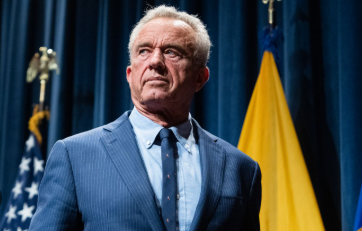RFK Jr. Risks Our Health

Prior to his confirmation as the Secretary of Healthy and Human Services, Robert F. Kennedy Jr. made waves as a controversial pick for the position due to his alarming history of medical views, including statements that there’s no vaccine that is safe and effective, antidepressants cause school shootings, and Covid-19 targets white and black people while sparing Ashkenazi Jewish and Chinese people. As one would expect, many credible members of the medical community were unhappy with the selection of Kennedy. More than 17,000 doctors signed a letter petitioning for a rejection to Kennedy’s nomination, claiming that Kennedy’s anti-science views are “a slap in the face” to doctors that protect patients from preventable illnesses.
Nevertheless, in spite of his purposeful spread of medical misinformation and the widespread reproach his appointment garnered, the inevitable happened. On February 13, Kennedy was confirmed 52-48 in a party-line vote. 52 Republicans voted for Kennedy while 47 Democrats/Independents voted against him. The sole Republican to sever the conservative unanimity was Sen. Mitch McConnell. The Kentucky Senator fought polio as a child and was a staunch supporter of the Covid-19 vaccine. McConnell said he has seen “vaccines save millions of lives from devastating diseases” and believes that the U.S. “deserves a leader who is willing to acknowledge without qualification the efficacy of life-saving vaccines.”
Unfortunately, that’s not what the U.S. is getting, and we are seeing the effects of this inadequacy.
In February, a measles outbreak began in Texas, and it has now spread beyond. On March 2, Kennedy wrote an op-ed for Fox News in response to the scourge. In the headline, he calls the outbreak a “call to action for all of us,” and in the subheader, he asserts that the measles vaccine is “crucial to avoiding potentially deadly disease.” Kennedy may seem judicious in the beginning of his article, but as the article progresses, he regrettably returns to his roots. Kennedy calls the decision to vaccinate a “personal one,” in the sentence before affirming that vaccines “protect individual children from measles… [and] contribute to community immunity, protecting those who are unable to be vaccinated due to medical reasons.”
Yes, vaccination is an individual choice, but one that just so happens to affect everyone around you. The HHS Secretary concludes his article by suggesting that “good nutrition remains a best defense against most chronic and infectious illnesses,” alluding to how America famously beat measles by eating their broccoli.
The situation isn’t entirely bleak, though. The Trump administration recently withdrew their nomination of Dave Weldon for CDC director. Weldon is known for being an outspoken anti-vaxxer, and he wasn’t receiving enough support from even his fellow Republicans, one being Sen. Bill Cassidy. Cassidy was undecided, but responded to Weldon’s capitulation by saying that the nominee clearly did not have what it takes to direct the CDC since he dropped out before the hearing even began.
We may be heading in the wrong direction with medicine, but with enough pushback, we can avert the worst case scenarios.